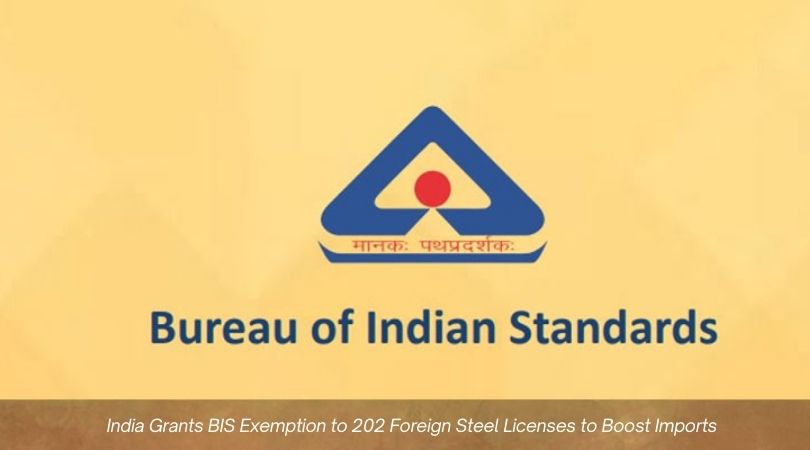12th August 2025, India
India’s Steel Ministry recently provided considerable relief to 202 foreign steel production licenses by exempting them from obligatory Bureau of Indian Standards (BIS) conformity under the Steel Import Monitoring System (SIMS) portal. This policy action, off a June 11 notification, permits foreign companies to provide steel to Indian Integrated Steel Plants (ISPs) without prompt input-material BIS certification, on their self-certification basis, subject to verification later.
This exception involves 72 foreign integrated steel mills in 16 nations, primarily large exporters such as South Korea (over 50 licenses), Japan (over 80 licenses), Germany, Italy, France, Russia, and the United States. In order not to compromise quality levels, this move is aimed at ensuring continued access to critical high-grade steel for local manufacturing.
BIS and Its Role in the Steel Industry
The Bureau of Indian Standards (BIS) is India’s national standards body responsible for setting quality benchmarks for various products, including steel. BIS certification for steel imports guarantees that, prior to being permitted on the domestic market, foreign-made goods fulfil India’s quality and safety standards.
Although this system shields industries and consumers from inferior goods, it has also come under fire for creating supply constraints because of protracted approval processes. Because the steel industry depends heavily on infrastructure and capital, it frequently needs to quickly acquire specialized steel grades for industrial, construction, and manufacturing projects.
Under specific circumstances, the Ministry anticipates to waive this requirement in order to:
- Improve ISPs’ supply chain continuity.
- Encourage industries with high demand that depend on advanced steel inputs.
- Increase the sector’s ease of doing business while staying in line with larger manufacturing growth goals
Broader Regulatory Trends & Quality Oversight
India is also tightening its vigilance against low-quality steel imports through stricter norms in advance authorisation schemes. The objective of authorities is to prevent the diversion of duty-free steel intended for exports to the domestic market by export-oriented units.
Critical suppliers benefit temporarily from the BIS exemptions, but they are a part of a larger strategy to realign the regulatory framework in order to balance quality control with industrial growth and fair market practices.
Details of the New Exemption
As stated in the announcement from the Ministry of Steel:
- 202 BIS licenses are exempt from the requirements for quality certification.
- These licenses are held by 72 foreign manufacturing facilities in 16 different countries.
- Integrated Steel Plants (ISPs) that require specialized input materials that are not easily accessible in India are the main beneficiaries of the exemption.
- High-quality steel products used in industries like heavy machinery, renewable energy, shipbuilding, automotive, and defense are covered by the policy.
Countries & Key Players Benefiting
The exemption applies to leading steel-producing nations and companies with strong trade relations with India:
Japan – Nippon Steel, JFE Steel
South Korea – POSCO, Hyundai Steel
United States – U.S. Steel, Cleveland-Cliffs
Russia – Severstal, NLMK Group
Others – Germany, France, UK, Italy, Brazil, and China (select grades)
India’s multi-source import diversification strategy, which lessens over-reliance on any one nation, is demonstrated by this wide geographic distribution.
Policy Critique & Expert Perspectives
Ajay Srivastava, founder at Global Trade Research Initiative (GTRI), critiques the rationale behind requiring certifications for raw inputs when final products already undergo BIS compliance. He highlights that MSMEs that depend on flexible, low-volume supplies find such upstream regulations to be unfeasible.
Furthermore, rather than being considered a systemic change, the policy is seen as a short-term fix. In an effort to get input from the industry on SIMS-related issues, Quality Control Orders (QCOs), and NOC conditions, the Ministry is hosting an open house on August 19. This shows that it recognizes the frustrations of the industry as a whole and the possibility for reform.
Impact on Domestic Steel Industry
The exemption has both opportunities and challenges for domestic producers.
Positive Impacts:
Ensuring Supply of Raw Material – ISPs are now able to source essential grades of steel without undue delay in approvals, for seamless production.
Potential Technology Transfer – Joint ventures with overseas suppliers could result in technology transfer and capacity building in India.
Cost Effectiveness – Quick procurement avoids project slippages and inventory carrying charges.
Challenges:
Competitive Pressure – Local mills rolling similar grades will be under the pressure of prices and demand from lower-cost imports.
Overdependence on Imports – Inordinate dependence might negate India’s self-reliance aims in the long run.
Quality Monitoring – Despite exemptions, monitoring imported steel’s quality standards must continue.
Impact by Sector
The BIS exemption’s advantages will be most apparent in:
- Access to innovative automotive-grade steel for electric vehicles and fuel-efficient vehicles is provided by automobile manufacturing.
- High-strength steel for solar panel frames and wind turbine towers is an example of renewable energy.
- Corrosion-resistant grades are crucial for aerospace and naval applications in defense and shipbuilding.
- Specialized track steel and structural materials are used in railroads and metro projects.
Long-Term Prospects
- The exemption will reduce project delays and increase material availability.
- As Indian mills may implement new technology to match the quality of imported products, it may eventually lead to competitive upgrading in domestic steel production.
- Long-term, India will require a well-rounded approach that encourages the development of domestic capacity while preserving room for essential imports.
Conclusion
The BIS exception for 202 steel foreign licenses is a selective trade facilitation measure aimed at meeting India’s near-term requirement of specialized steel products. Although it provides unambiguous advantage in the import of raw material for core sectors, it also puts competitive pressures on the domestic industry to become more competitive and offer diversified product lines.
India’s steel sector stands at the crossroads striking the balance between import dependence for high-grade inputs and achieving self-reliance in strategic commodities. Whether this strategy is successful will require prudential implementation, rigorous quality control, and aggressive domestic capacity development.








